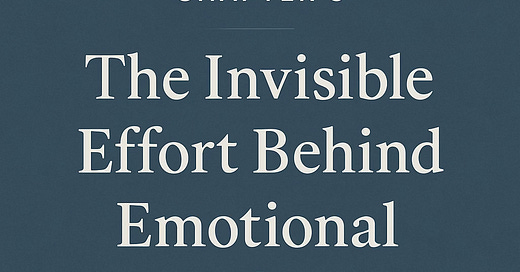Chapter 5: The Invisible Effort Behind Emotional Safety
From the THX Series Hub - Behind the Mask: The Invisible Labor of Neurodivergent Survival
“You’re so good with clients.”
“You bring such a calming energy to the room.”
“They trust you because you speak with confidence.”
These are things I’ve heard—and maybe you have too.
On the surface, they sound like compliments. Signs that you're valued, respected, even admired.
But underneath, they reveal something deeper—and far heavier.
They reveal the invisible labor of masking.
The constant, unacknowledged work of managing not just your own emotions, but the emotions of everyone around you.
Because in many environments, especially high-stakes professional ones, emotional safety is a currency.
And for neurodivergent people, being "safe" often means carrying the emotional burden others aren’t willing—or able—to carry themselves.
What Emotional Safety Really Costs
Reading the room constantly to detect shifts in energy or tension.
Modulating voice, pace, body language to maintain others' comfort.
Anticipating emotional needs before they're spoken.
Suppressing authentic reactions to preserve the flow of conversation.
Adjusting delivery of ideas so others can hear them without defensiveness.
Every meeting. Every call. Every hallway conversation.
It’s not just “being good with people.” It’s an entire second job, performed silently, without training, compensation, or recovery time.
THX Frameworks Behind the Invisible Effort
12 Utilities — Ease of Use, Availability, and Security are maintained for others at personal cost.
PERMAH — Positive Emotion and Health are depleted to sustain group safety.
Admiration Equation — Skill, Goodness, and Awe are generated—but true Gratitude is rarely returned.
Prospect Theory — Fear of relational loss drives the decision to self-regulate instead of disrupting group dynamics.
Micro-Moments — Every act of smoothing tension or hiding discomfort is a micro-moment of emotional expense.
The Emotional Landscape
Chronic fatigue from hyper-attunement to others’ emotional needs
Emotional disconnection from self (because authenticity is secondary to group comfort)
Imposter syndrome (feeling admired for labor no one sees)
Bitterness or resentment (when effort goes unacknowledged or expected indefinitely)
When emotional labor becomes invisible, it becomes infinite.
Final Thought
Emotional safety doesn't just happen. It’s built—often by the ones already carrying the most weight.
If you've been praised for being the calm, trusted, steady hand—know this:
Your skill is real.
Your labor is real.
And your exhaustion is not a failure. It’s the logical consequence of a system that asks you to regulate what it refuses to manage.
Recognition is the first step. Redesign is the next.




